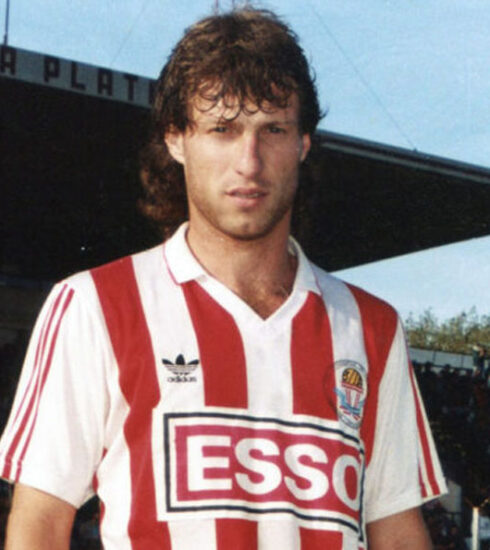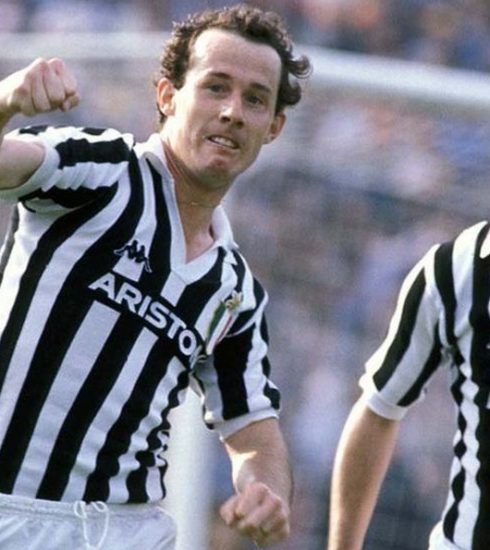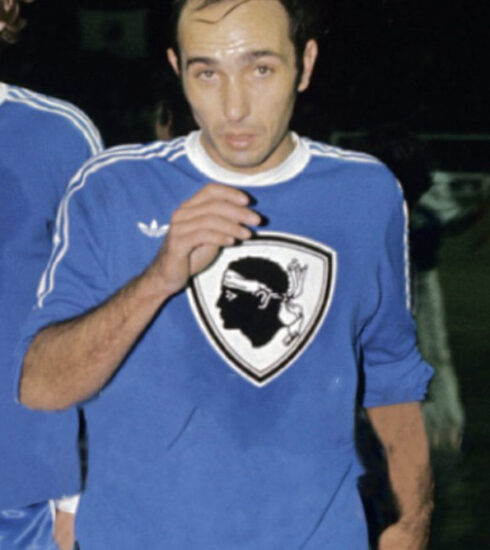GEORGI ASPARUHOV: A legend for the few



If you ask any football fan at any latitude to name the greatest Bulgarian footballer of all time, the answer will be unequivocal: Hristo Stoichov.
Ballon d’Or and a fantastic footballer who played at sublime levels with Barcelona and with his national team, contributing decisively to taking it to the top four in the world at the 1994 World Cup in the USA.
That will be the name you will hear answered everywhere.
Everywhere … except one place: Bulgaria.
In Bulgaria the majority will tell you another name, a name virtually unknown to everyone else.
They will tell you that in their parts someone as strong as Georgi Asparuhov has never been seen again.
These are not the fantasies of a small-town chronicler in love with the history of football and all that is romantic and ‘out of date’.
That Georgi Asparuhov was the best Bulgarian footballer is said by a vote taken a few years ago to elect the ‘Best Bulgarian Footballer of the 20th Century’.
Georgi Asparuhov, known to everyone as ‘Gundi’, won this title, obviously ahead of Hristo Stoichov.
For fans of rankings, it is also fair to mention that Asparuhov is ranked 40th (tied with our Paolo Rossi) among European footballers of the last century by the prestigious IFFHS, the International Federation of Football History and Statistics. Behind him are footballers like our Gigi Riva, Paolo Maldini and Roberto Baggio, the Poles Deyna and Boniek and people like Ruud Krol, Gheorghe Hagi and … Hristo Stoichov!
But who was George Asparuhov?
‘Gundi’ was born in Sofia in May 1943 and soon revealed himself to be an absolute marvel on an athletic level. He is tall, has great agility and impressive elevation.
As a boy he regularly played football and volleyball, attracting the attention of the coaches of both sports.
At the age of fifteen, he went for a tryout with Levski, the team he cheers for.
What he sees from his first mentor, Konstantin Georgiev, leaves him breathless.
‘This boy is a born footballer. There is nothing we can teach him’.
He immediately joined the ranks of Levski and his ability was such that at the age of 17 he was made his first-team debut in a match against Botev, a team that was to return powerfully in Asparuhov’s career and life.
His athletic physique and stature convinced the coaches to deploy him in the centre of defence even though ‘Gundi’ had always played as a striker and still considers himself as such. But he is a young man of great education and intelligence and accepts his new position on the pitch without a word.
Already in his second official game with Levski he scored his first goal, thus starting to send important signals to his coaches about his real skills and characteristics.
Football, however, does not convince him completely.
He plays extremely fair and elegant, loves to come out of defence with the ball at the foot to set up the action, and the ease with which he jumps over opponents in dribbles soon makes him the favourite target of opponents who find nothing better than to ‘knock him down’ as soon as he tries to put his nose outside his own penalty area.
At that particular moment in his career, Asparuhov, who has never hidden his passion for volleyball, is tempted to return to his first love.
Perhaps less lucrative than football but ‘safer’ for his joints and, moreover, just as much fun for him.
Fortunately for Bulgarian and world football, the turning point is coming.
Asparuhov is called up with the Bulgarian youth national team for an international tournament in Austria.
He always played as a central defender, but his insertions, his powerful and precise shot and his skill in the aerial game when he broke free to jump into the area on corners and side kicks became more and more evident … but when in this tournament he scored a goal practically from the middle of the pitch with a powerful and precise shot, everyone was finally convinced that ‘Gundi’s’ role was a different one: that of number 9 in the centre of attack.
Asparuhov in the 1961-1962 season finally plays as a striker in his Levski. He scored four goals in the first seven games of the season when the call from the Fatherland for military service arrived.
Two long years of marches, guards and drills.
But no one is stupid enough not to realise that such talent cannot be thrown away.
A ploy is found.
Asparuhov will do his military service, in the small town of Vratsa, but he will be able to train and play regular football with the nearest club, Botev Plovdiv.
Botev, a team that had always fought among the less noble areas of the Bulgarian First Division, immediately won the Bulgarian Cup, thus gaining access to the Cup Winners’ Cup, and in the following season they won a prestigious second place in the championship … leaving behind all the great teams of the capital … including Levski Sofia.
In the meantime, however, ‘Gundi’ has already firmly established himself in the senior national team.
He was called up for the 1962 World Cup in Chile and played in both the second and third matches against Hungary and England respectively.
For the Bulgarians it was to be a disastrous World Cup.
One draw (against England) and two defeats against Argentina and Hungary, but no one missed the brilliant performance of the 19-year-old Asparuhov.
The following year, having completed his service, Asparuhov made his return to Levski.
He is now an established champion and Levski builds the team around this footballer who technically and physically simply has it all.
He plays as a centre forward but likes to often drop back to the midfield to set up the action himself or to start off on the ball with his phenomenal progressions.
In the 1964-1965 season with 25 goals in 27 matches he led his Levski to victory in the championship (after twelve long years of waiting) and it was the first of three triumphs that ‘Gundi’ would achieve with ‘the blue avalanche’ (one of the nicknames of the Sofia club).
In the following season Asparuhov would play in the Champions Cup for the first time.
In the second round of the Champions Cup, Levski, after having easily overcome the first against the Swedes from Djurgarden, had to face one of the favourite teams: Benfica of Eusebio, Torres and Coluna.
It will be two tight games.
Levski at home will stop the Lusitanians at two to two and will lose narrowly, three to two, in the return match in Portugal.
Georgi Asparuhov will be the first player from a visiting team to score two goals in Lisbon’s famous ‘Esatadio da Luz’.
Meanwhile, Bulgaria is fighting tooth and nail to snatch a place for the World Cup in England the following summer.
To achieve this, a play-off is needed.
Opponent will be Paul Van Himst’s Belgium, another great and not enough celebrated talent.
It will be played in Florence.
It is 29 December 1965.
Georgi Asparuhov will drag his team to triumph.
He will score both goals in the two-to-one victory.
The first with a splendid header and the second with a precise shot with the outside of his right foot after controlling a throw in from the back.
In that match, Asparuhov would hit the crossbar twice, once with a prodigious diving header and again with a broadside from twenty metres.
Many Italian coaches and managers were in the stands that day.
And Georgi Asparuhov would soon become a target, unfortunately never realised, for several teams in our league.
Also in that 1965, the nomination for the Golden Ball arrived for ‘Gundi’.
He would finish eighth, ahead of the likes of Frank Beckenbauer, Ferenc Puskas and Lev Yascine.
At the English World Cup, Bulgaria will certainly not be lucky.
They were drawn into an impossible group against Pelé’s Brazil, Florian Albert’s Hungary and Eusebio’s Portugal, and were defeated three times in the first round, although, as four years earlier in Chile, the only one to be saved was ‘Gundi’ Asparuhov, who scored the only goal for the Bulgarians in the tournament, the one that gave them an illusory lead against Hungary.
After that World Cup, however, Bulgaria became one of the most fearsome teams on the continent.
Serial victories came against Yugoslavia, Sweden, Holland and even Italy in the 1968 European Championship qualifiers, a three-two victory in the first leg match in Sofia.
But the authentic masterpiece that would further propel Asparuhov to the top of world football came during the match at Wembley against world champions England.
His goal, which put his side ahead before Geoff Hurst’s late equaliser, will remain in the collective memory of those who witnessed that match.
With Bulgaria on the ropes trying to resist the English attacks from the back, a high ball arrives right on the midfield line.
Asparuhov is the only Bulgarian player left in the attack.
His elevation allowed him to anticipate Brian Labone, touch the ball with his head, turn and go for it.
Full-back Keith Newton returns to him. Asparuhov runs the ball through his legs and then sprints towards the opponent’s box.
Both Newton and Labone try to recover.
But there is nothing to be done. Asparuhov is quicker than they are and when he comes in front of the English goalkeeper, newcomer Gordon West, he beats him with a diagonal shot that goes inches wide of the post to the left of the English number one.
The English commentator remains in absolute silence for a good ten seconds almost in disbelief at what he has just seen.
It has been years since so many Western European teams have tried in every way to include this wonderful striker in their ranks.
There is nothing they can do. Bulgarian footballers are not allowed to leave the country.
Asparuhov willingly accepts his government’s decision.
He loves ‘his’ Levski and is happy to play for the ‘Blue’ of Sofia.
He continues to play, win trophies and score many goals for Levski and his Bulgaria.
He is often forced to stop because of physical problems. At home they know only one way to stop him: beat him and thus prevent him from expressing all his class.
At the 1970 World Cup in Mexico he played, dragging behind him a series of ailments that prevented him from shining as usual.

It is 30 June 1971.
Georgi Asparuhov had been sent off in the previous game against CSKA Sofia. An absolutely rare occurrence for a footballer of his correctness and phlegm.
This time, however, the rough entrances of the opposing defenders caused him to lose control.
Given his disqualification for the next match, he asked the management for permission to go to his old team where he played during his military service years and where he is still an absolute idol: Botev Plovdiv, who invited him to the party to celebrate the club’s 50th anniversary.
Accompanying him is a close friend, centre forward Nikola Kotkov, nicknamed ‘the cat’ for his incredible agility.
The two stop along the way to refuel ‘Gundi’s’ Alfa Romeo.
They are approached by a hitchhiker who asks them for a lift to Plovdiv.
Asparuhov, well known for his helpfulness and kindness, welcomes the passenger on board.
A few kilometres later, near Vitinya in the Balkan Mountains, ‘Gundi’s’ car collides head-on with a heavy goods vehicle.
The three will die instantly.
Georgi Asparuhov was 28 years old.
At his funeral in Sofia he will be accompanied by 550,000 people.
An incredible testimony of affection from all the Bulgarian people … who still have never forgotten the greatest footballer in the history of their country.
ANECDOTES AND CURIOSITIES
When Asparuhov finally decided to leave volleyball for football, the coach of the Bulgarian national team at the time said that ‘Bulgaria had lost probably the strongest volleyball player in its history’.
Not bad. The strongest will become football’s strongest.
Levski Sofia’s stadium will become ‘Georgi Asparuhov Stadium’ from 1990 and at the main entrance there is a statue in honour of the great striker of the ‘Отбора на народа’ or ‘The People’s Team’.
In his first appearance in European football, in the Cup Winners’ Cup of the 1962-1963 season, Asparuhov even won the goalscorer’s table of that edition, scoring six goals in six matches. In that edition, Levski made it all the way to the quarter-finals before falling to the Spanish side Atletico Madrid.
In 1967, AC Milan, who had been drawn against Levski Sofia in the Cup Winners’ Cup, tried with all possible determination to take him away from Levski. There was talk of the equivalent of half a million dollars and a safe way out of Bulgaria. A stratospheric sum for the time.
And on his arrival in Italy his salary would have been identical to that of Gianni Rivera, the Rossoneri’s star player and the highest paid player at the club.
But his loyalty to Levski and his homeland would make him respond to the Rossoneri emissaries as follows:
“There is a country called Bulgaria. There is a team in this country called Levski Sofia. You have probably never heard of it, but it is the place where I was born and where I want to die’.
Nereo Rocco, the famous ‘Paron’, coach of the Rossoneri, described him as ‘the striker of my dreams’.
Another great admirer of Asparuhov was the Portuguese striker Eusebio.
For the ‘black panther’ Asparuhov was the ‘attacking partner I longed to play with. In the match played here in Lisbon he won everyone over, fans and us footballers’.
One of the first to coin the term ‘artist’ for him, one of his nicknames in his homeland, was another great footballer of the time, the Hungarian Florian Albert, winner of the Golden Ball in 1967.
This is how he described Asparuhov’s talent.
‘An artist of the ball. A footballer of the rarest quality capable of giving the fans pure joy’.
Very touching is the story of the girl who last saw ‘Gundy’ alive.
She was the one who filled poor Georgi with petrol on that 30 June 1971.
“He was polite and kind. The amount of the petrol fill-up was 9.20 levs. He told me to keep the change. I insisted that he accept it and ran to the cashier to get change. When I returned his Alfa Romeo was gone. He wanted to make sure I kept that money’.
Finally, the beautiful memory of a footballer who played several times against Asparuhov and who had an enormous regard for him: our Sandro Mazzola.
‘When I heard of his death I started to cry. How could fate take such an extraordinary footballer from us? I couldn’t close my eyes for the whole night. I kept seeing him in action in the match he played against Belgium in Florence. That day, I fell in love with the great footballer that was Georgi Asparuhov’.

Asparuhov’s goal against England.






